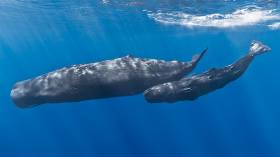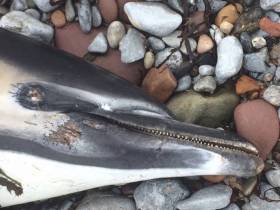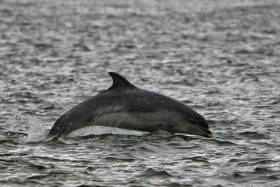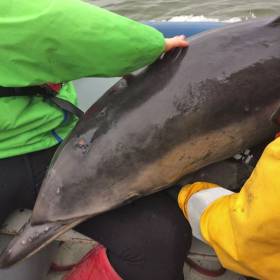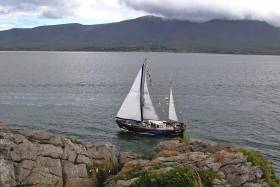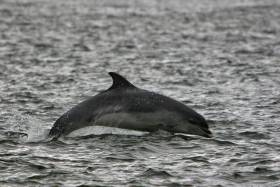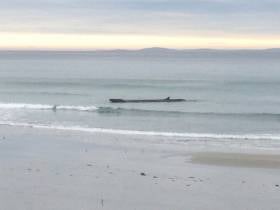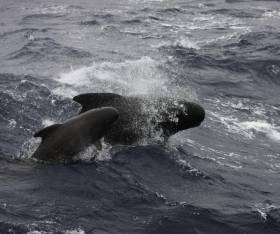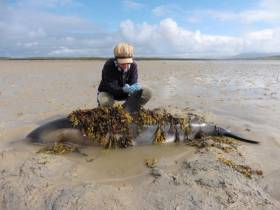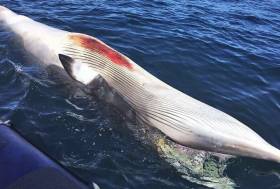Displaying items by tag: IWDG
Sperm Whale Carcass Washes Up On Wexford Beach
#MarineWildlife - The carcass of an 11-tonne sperm whale has washed up at Carnsore Point in Co Wexford, as the Gorey Guardian reports.
The 8.5m whale — discovered by local man Davie Rea on the rocky shore at the end of last week — was identified as an adult female by the Irish Whale and Dolphin Group (IWDG).
Kevin MacCormick of the IWDG added that the giant marine mammal appeared to be emaciated “so most likely it was not in good health”.
It’s been five years since the last sperm whale stranding on the Wexford coast, as the species is more often found in western waters.
The Gorey Guardian has more on the story HERE.
2017 ‘Worst Year On Record’ For Whale & Dolphin Strandings
#MarineWildlife - Not even two months in and 2017 is already the worst year on record for whale and dolphin strandings, according to the Irish Whale and Dolphin Group (IWDG).
As of Friday 17 February, a whopping 56 cetacean standings had been recorded — more than half of them identified as common dolphins.
Prior to 2010, the average numbers of standings were around 22, of which five would have been common dolphins, says the IWDG’s strandings officer Mick O’Connell.
The question of what is happening to cause such a spike in strandings throughout this decade prompted a meeting between the IWDG, Government agencies and representatives from Irish and European fishing fleets earlier this week.
“There is a disconnect somewhere,” says O’Connell, “as internationally accepted visual evidence of bycatch is seen in some strandings, and post-mortem reports on five common dolphins in Mayo in 2013 reported that their deaths were likely to be due to bycatch in a pelagic trawl net, yet Irish and EU observer schemes involving pelagic trawlers reported no bycatch in commercial pelagic hauls.”
The latest stranding was recorded in Fenit, Co Kerry on Wednesday (15 February) — a dolphin alleged by locals to have been caught in the nets of a large trawler offshore before being dumped overboard, as the Irish Mirror reports.
The Irish Examiner adds that another common dolphin with blood marks was found at Ballyconneely Beach in Connemara on the same day, while two days previous the emaciated carcass of a sperm whale was found on Nethertown Beach at the most south-easterly point of Co Wexford.
Last month, a spate of marine wildlife standings on the Waterford coast was blamed on pair trawling activity in the area.
Whales & Dolphins Dominate New Atlas Of Irish Mammals
#MarineWildlife - Ireland’s whales and dolphins feature in a new atlas of the country’s wildlife, as The Irish Times reports.
The Atlas of Mammals in Ireland 2010-2015, published by the National Biodiversity Data Centre, maps the distribution of 77 mammal species both on the island and in its territorial waters.
Cetaceans account for almost a third of this number, among a whopping 68 species of whales and dolphins that frequent Irish waters.
The Irish Whale and Dolphin Group’s Dr Simon Berrow relates his long-term study of the Shannon Estuary’s thriving population of bottlenose dolphins in a book that celebrates an encouraging national habitat for species that struggle not so far from our shores.
Afloat.ie readers might remember a previous atlas concentrating on Ireland’s abundance of marine mammals that was published in 2013, and for which this new book makes a useful comparison.
Dolphins Rescued In Tarbert Stranding Drama
#MarineWildlife - The Irish Whale and Dolphin Group (IWDG) reports the good news of the rescue of two live common dolphins that stranded on a Co Kerry beach at the weekend.
IWDG volunteers found three dolphins at Tarbert on Sunday morning (8 January), one of which was already dead while the others were in shallow water, with one of them swimming into even lower waters upriver towards Tarbert village.
“We knew we had to come up with a plan as the area is surrounded with mudflats, and once the tide started to recede we would not be able to get access to or re-float the dolphin if it stranded again,” reported Joanne O’Brien.
That’s when Tarbert Rowing Club came to their aid with a small inflatable that allowed the volunteers to retrieve the bewildered dolphin and steer it in the right direction.
The IWDG has more on the story HERE.
Protections Called For Shannon Dolphins In North Kerry
#MarineWildlife - Conservationists want Tralee Bay and Brandon Bay in North Kerry to be declared a protected marine wildlife zone for bottlenose dolphins.
The call comes in the wake of new research by the Irish Whale Dolphin Group (IWDG) in tandem with the Shannon Dolphin and Wildlife Foundation, which has identified the vast majority of bottlenose dolphins in North Kerry as members of the Shannon Estuary group that has enjoyed Marine Protected Area status since 2000.
“We knew dolphins had been regularly observed in Brandon Bay,” said the IWDG’s Dr Simon Berrow of the new research, “but did not know which population they belonged to and had no idea they were as abundant and frequent as this study has shown.”
Stephanie Levesque, senior author of the study, added that the research identified “very high numbers of Shannon dolphins present during the summer months in Brandon and Tralee Bays.
“If further surveys were to be carried out at various times of the year, including collecting behavioural data, it could help us to better understand how they are using these habitats.”
Elsewhere on the West Coast, Galway Bay FM reports on efforts in Connemara to form local groups in Oughterard and Letterfrack which are designated for the protection of pearl mussels.
New North Kerry Local Group For Dolphin Watchers
#MarineWildlife - The first meeting of the Irish Whale and Dolphin Group’s (IWDG) new local group for North Kerry takes place this Friday 9 December at the Tralee Bay Wetlands Centre from 7.30pm to 9pm.
All are welcome to the evening’s talk by biologist Dr Marie Louis on her work on bottlenose dolphins in Ireland and internationally, followed by a meeting on setting up the new group.
The North Kerry group’s main focus is to get local people out experiencing and recording cetaceans and collecting data for the IWDG, as well as increasing membership numbers. Contact [email protected] for more information.
In other news, Conal O’Flanagan has been appointed to the IWDG’s board of directors, replacing regular Celtic Mist helm Karl Grabe.
O’Flanagan joined the IWDG soon after its formation in 1999 and was the first co-ordinator of its Constant Effort Sighting Scheme. The resident of North Co Dublin has previously been a director on the board and served as group treasurer.
Large Whale Stranding On Mayo Beach
#MarineWildlife - The Irish Whale and Dolphin Group (IWDG) received a report at the weekend of a large baleen whale struggling in the shallows at Cross Beach in north-west Co Mayo.
The 12-metre marine mammal, thought to be a sei whale or fin whale, was ushered back into deeper waters by a group surfing in the area on Sunday 27 November.
But locals are urged to keep a lookout over the next few days as the whale, believed to be injured or in poor health, is likely to strand again.
Wexford Men Come To Rescue Of Beached Pilot Whale
#MarineWildlife - A young pilot whale was saved by a group of quick-thinking Wexford men after stranding on a beach at Kilmore Quay, as the New Ross Standard reports.
When Neil Bates spotted the 3m whale at Ballyteige Burrow and saw its blowhole move, he enlisted two other local men, John and Michael O'Flahery, to help refloat the animal.
And while it was it some distress for a time, it was soon out of the shallows and swimming in the direction of Hook Head.
In other marine wildlife news, the Irish Whale and Dolphin Group is seeking to recruit a new general manager, based out of the Shannon Dolphin Centre in Kilrush, Co Clare.
#MarineWildlife - The Irish Whale and Dolphin Group (IWDG) has reiterated the need for localised stranding plans after the death of two common dolphins that stranded in Mayo's Blacksod Bay in late July.
Aoife Foley of the IWDG writes that the two dolphins were part of a pod of five that were spotted close to the shore at Mullaghroe Beach on Saturday 23 July.
A team from the Broadhaven Bay Marine Mammal Monitoring Programme joined local marine biologist Machiel Oudejans to move the dolphins, which did not appear to be injured or in obviously poor health, back into deeper waters and out to sea.
However, the following afternoon a member of the programme team saw that two of the marine mammals had stranded on the same stretch of beach, which Foley says is "notorious for common dolphin strandings in Blacksod Bay".
Despite best efforts, by Tuesday 26 July one of the animals had died and the other had to be put down by the National Parks and Wildlife Service.
The IWDG has more on the story HERE.
Minke Whale Deaths Cause For Concern In Kerry
#MarineWildlife - A number of dead minke whales found off the Dingle Peninsula in recent months have puzzled locals and experts alike, as TheJournal.ie reports.
The carcasses of three juvenile minkes have been spotted in the region since April, comprising 25% of all Irish minke whale standings since records began in 2000.
A fourth whale carcass was found on the shore at Killough in Co Down last week, according to BBC News.
But no one seems to know the reasons for these marine wildlife deaths, with the lack of a post-mortem scheme for whale strandings making matters even cloudier.
Mick O’Connell, strandings co-ordinator of the Irish Whale and Dolphin Group (IWDG), believes the phenomenon is localised to the Dingle Bay area.
Yet while the species is a regular visitor to the Blasket Islands and environs, O'Connell says it's "very unusual to have so many dead ones in the one small area, in the space of 10 or 12 weeks."
The same region also saw a number of unsubstantiated dolphin deaths in recent weeks, which one fishery expert suggested might be connected with the presence of so-called 'supertrawlers' fishing in the area.
Similar concerns were raised earlier in the year when a spike in common dolphin standings, primarily in the North West – totalling 28 for January and February alone – coincided with reports of supertrawler activity off the Dongeal, Sligo and Mayo coasts.


























